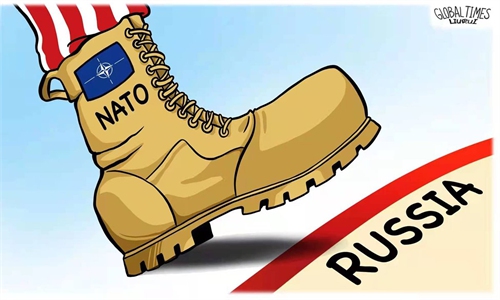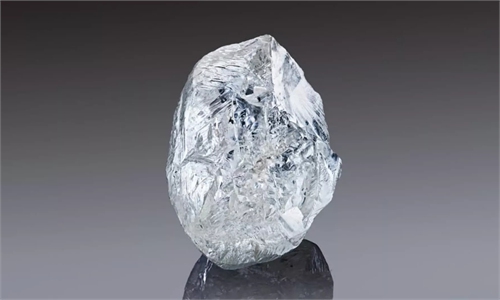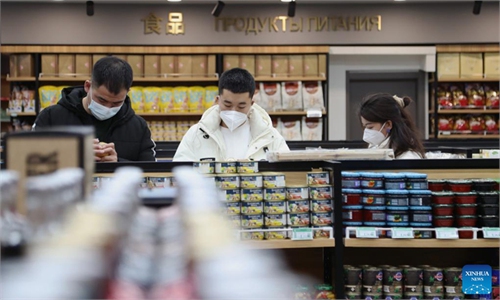IN-DEPTH / IN-DEPTH
GT on the spot: A glimpse into Russia amid Ukraine crisis shows no sign of West-predicted economic collapse or political instability
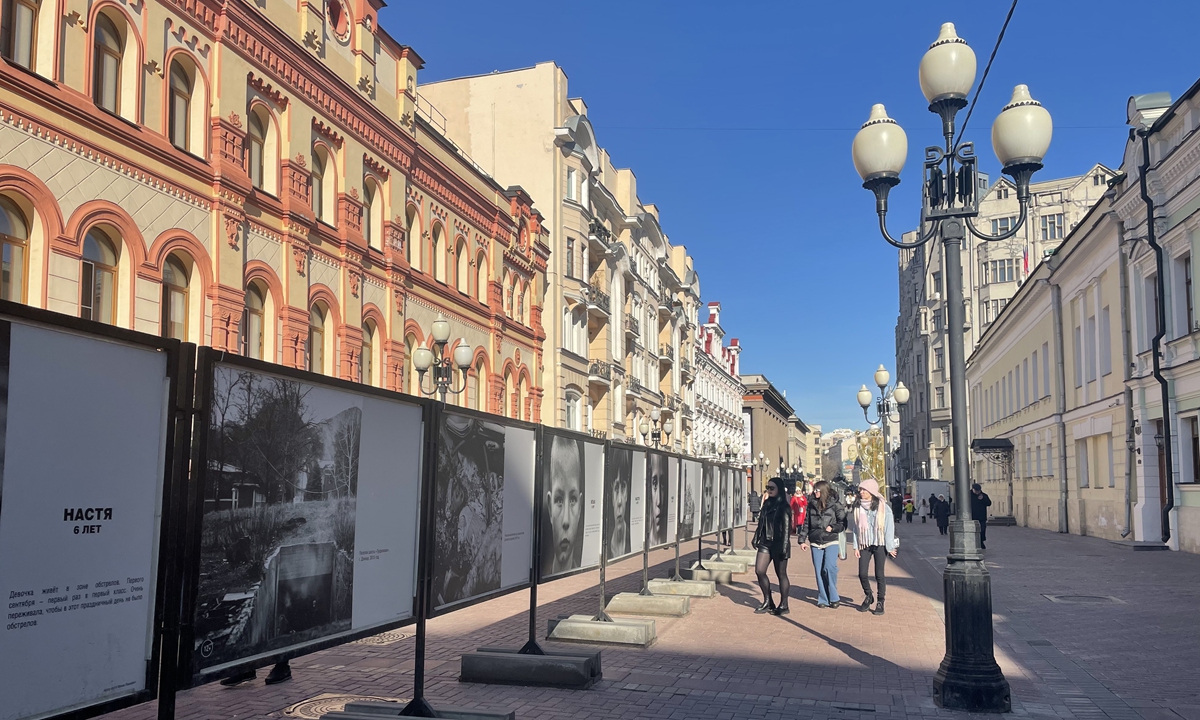
Local residents in Moscow pass by a photo exhibition on the streets. Photo: Bai Yunyi/GT
As the Russia-Ukraine conflict enters its second year, the impact of the war on Russia and Ukraine has become increasingly prominent. Although Ukraine's economy has suffered a huge decline and the war did not take place in Russian territory, the "imprints" of war and the impact of Western sanctions can still be felt in Russia.The Global Times reporter Bai Yunyi recently visited Moscow's supermarkets, shopping malls, and streets to closely observe Russia's social economy and ordinary people's lives more than a year after the Russia-Ukraine conflict erupted., Russia, which has been sanctioned since the Crimean crisis, has also shown unique resilience. There has so far been no sign of a general economic collapse or political instability in Russia.
Stable prices and sufficient supply
Similar to most international cities, a walk through the suburbs of Moscow in the late afternoon or early evening reveals people enjoying leisurely strolls on their way home from work.
Some local residents said that when the US sanctions came into effect in 2022, the prices of Russian goods did rise, and many anxious people were eager to exchange cash for goods, fearing severe inflation in the future. But now, at least in Moscow, prices and goods supplies have stabilized.
Prices of commodities in supermarkets across Moscow are comparatively similar to first-tier Chinese cities like Beijing and Shanghai. For example, a carton of 30 eggs retails for about 25 yuan ($3.64), a liter of milk is priced at 7.5 yuan, half a kilogram of shrimp is about 22 yuan, and half a kilogram of beef is 37 yuan.
Even though vegetables and fruits other than potatoes and carrots are much more expensive than in China, the higher price can be attributed to the local climate and availability and has little to do with the war and sanctions.
Leonid, a Moscow resident, told the Global Times that the vodka he usually drinks, the cigarettes he smokes, and the food he consumes have slightly increased in price over the last year, but not by much. The prices of certain "big items" such as cars have risen sharply, but he believes that this is due to both sanctions and the COVID pandemic.
One year after the start of the Russia-Ukraine conflict, Western countries imposed numerous sanctions against Russian banks and companies, which significantly affected the Russian economy. Yet the economic collapse some expected never came, the Al Jazeera said in an article in February.
"Indeed, the Western sanctions did not undermine Russia's economic potential to an extent that the Kremlin would lose the ability to finance its war in Ukraine," the article said.
The Russian economy contracted by 2.1 percent in 2022, the AFP reported in February, citing the government's statistics agency Rosstat. Experts said the contraction was smaller than expected and is consistent with an expansion in the fourth quarter.
It also provided further evidence to suggest that the economy stabilized after the initial sanctions hit in the second quarter, according to media reports.
The Russian central bank also recently improved the 2023 Russian GDP outlook to between -1 percent and +1 percent instead of a decline of 1 percent to 4 percent in the October 2022 forecast, according to media reports.
A stabilized economy has become the basis for Russia maintaining social stability thus far. On the streets, schools, subways, and squares of Moscow, there is no evidence of any obvious disruption to people's quotidian routines, with a majority carrying on as normal.
Flower shops on the streets are still packed with customers and artists perform their musical pieces at subway stations, attracting passers-by to stop and watch and some even leave tips. Museum exhibitions remain open and the owners of open-air art stalls continue to see traffic. The only visible exceptions to this normal flow of life are bulletin boards on streets offering reminders to what is happening in the Donbas region.
The events of 2022 have confirmed that the Russian economy has areas of inefficiency but is resilient overall, and that the Kremlin is able to mitigate any destabilizing effects the economic downturn may have on the political front, Al Jazeera suggested.
Putin's political leadership has not been shaken, and Russia still enjoys a certain political status in the international community, and, frankly speaking, most Russian people still support Putin to this day, Zheng Yongnian, professor at the Chinese University of Hong Kong (Shenzhen), and president of the Institute for International Affairs, Qianhai, told the Global Times.
In the future, it is very unlikely that there will be a large-scale challenge brought against Putin's authority in Russia as predicted by the West, Zheng said.
Some brands fled Russia, others rebranded
Although the war and sanctions combined did not have a major impact on the public in Moscow, upon closer inspection, it is easy to find the "imprints" of war and blockades almost everywhere.
At the Moscow Sheremetyevo International Airport international arrivals bay, the atmosphere is different, with there being noticeably fewer Western European and American passengers as compared to five years ago. There is, however, an obvious increase in Chinese and Central Asian travelers alongside their Russian counterparts.
Customs checks are also more stringent than five years ago, and the personal information of every incoming passenger is scrutinized at length. A local reporter told the Global Times that just a while ago, Moscow customs officials who encountered journalists would query them on their views on the Russia-Ukraine war.
On the streets, the absence of Western business brands is also conspicuous. For example, beside the expressway from the Sheremetyevo International Airport to the center of Moscow, there used to be a row of car dealerships stocked with European- and American-made auto brands such as Mercedes-Benz, but such scenes have since been replaced with displays of Chinese-made auto brands.
Chinese-made auto brands such as Haval, Chery, and Geely now account for almost 40 percent of Russia's new car sales, according to media reports citing data from analytical agency Autostat and consulting company PPK. It's up from less than 10 percent in the January-February period of 2022, pouncing on the opportunity created by exiting firms such as Renault, Nissan, and Mercedes.
After the war erupted, many multinational brands quickly announced their withdrawal from Russia. After a year, some closed brand stores still dot shopping malls in Moscow today, such as Adidas, Puma, Zara, and IKEA among others.
One such store, a large Adidas store measuring several hundred square meters, remained shattered and dark despite still containing a large, well organized inventory of clothes and shoes on hangers and in containers. Whether this scene is due to a hasty retreat, or an anticipated reopening remains unclear.
Interestingly, some Western products have somehow reentered the Russian market. In the aforementioned mall, a seemingly Russian store carries Nike-branded shoes and clothes.
McDonald's Golden Arch logo was replaced with an orange "M", but the store still sells hamburgers and French fries, while Starbucks' English logo "Starbucks" was replaced with the similar brand name "Stars Coffee," and the iconic mermaid logo has also been replaced with the image of a long-haired woman similar to the original image.
Brand recognition is still high even though many of these brands have since been acquired by Russian businessmen, according to media reports.
One might wonder how brands which publicly withdrew from Russia are available in the Russian market once more, and the answer would be parallel importing, where retailers import products from abroad without the explicit permission of the trademark owner.
At the end of March 2022, the Russian government announced the legalization of parallel import.
In June 2022, Russian President Vladimir Putin signed a bill into law legalizing "parallel imports" in the country in a bid to stabilize prices amid Western economic sanctions. The law authorizes the Russian government to determine the list of goods that are subject to this new legislation.
Most Western brand products such as Nike in the Russian market are imported by businessmen from Kazakhstan and other countries that have relatively friendly relations with Russia through parallel imports. It also means that the market value of these products increases.
International soft drink brands like Coca-Cola and Sprite are still present in Russian grocery stores and supermarkets.
Big impact of financial sanctions
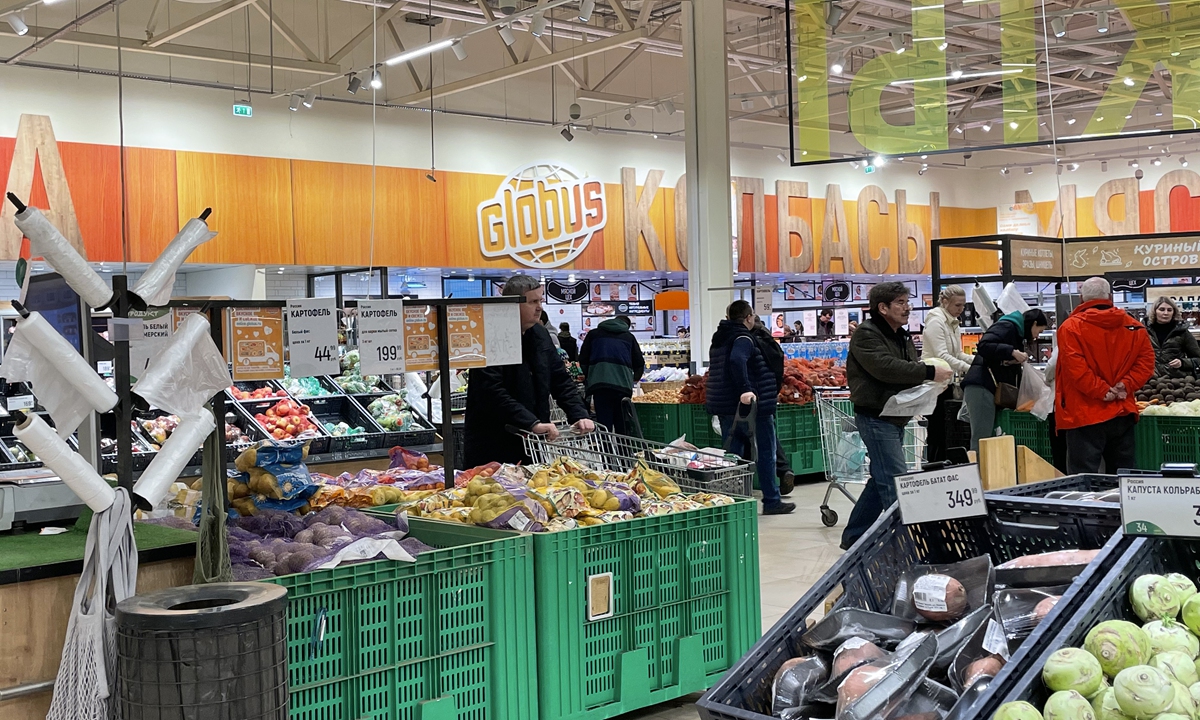
Local residents buy food and vegetables in a local market in Moscow. Photo: Bai Yunyi/GT
The most obvious impact of war and sanctions on Russia's social economy is reflected in finance. After being kicked out of the SWIFT settlement system, international Visa and MasterCard credit cards can no longer be used in Moscow, and UnionPay cards issued in China will also be rejected by the banking system during transactions while only UnionPay issued in Russia can be used.It also means that many foreigners entering Russia must rely on cash when traveling. Overnight arrivals might have to "hit the streets" to find money changers and exchange large amounts of rubles in cash to pay for hotels. It also means that Russian citizens are likely to encounter similar inconveniences when traveling to other countries.
As Russia was forced to withdraw from the dollar-dominated international financial system, Russia began to use more Chinese yuan. In October 2022, Russia became the fourth largest offshore trading center for the Chinese yuan, according to media reports.
When the Global Times reporter visited Russia in 2017, the reporter noted that although China and Russia had been promoting the settlement of bilateral trade in their own currency, many Russian businessmen still had insufficient confidence in the Chinese yuan and preferred to transact business in the US dollar.
Today, such attitudes have changed as the Chinese yuan has become an important option for cross-border transactions in Russia.
"Russia turns to China's yuan in effort to ditch the dollar," the Wall Street Journal declared in an article on February 28, noting that Moscow has "jettisoned longstanding concerns about giving China too much leverage over its economy."
Not only are energy exporters get paid more in yuan, but the country's sovereign-wealth fund is also increasingly using the Chinese currency to store its oil riches and Russian companies have also borrowed in yuan, the media report said.
Among individuals, the renminbi was used above all other currencies for cross-border transfers, the Financial Times said in an article on March 26, since anyone can buy renminbi on Russia's main exchange.
Yury Tavrovsky, deputy chairman of the Russian-Chinese Friendship Society and head of the expert council at the Russian-Chinese Committee for Friendship, Peace, and Development, told the Global Times that "the renminbi is becoming very popular in Russia, much more popular than the dollar," adding that it's necessary for the two countries to discuss how to maintain trade development amid US-led financial sanctions.
When the Ukraine crisis started in 2014, Russia began to promote the process of de-dollarization, reducing the value of the US dollar in Russia's foreign exchange reserves, and increasing the euro, yuan, and other currencies along with gold reserves, Zheng said.
The Economist said in an article, "Vladimir Putin's Fortress Russia is crumbling" in March, 2022, suggesting that the chaos in Russian markets shows the impossibility of economic "self-reliance."
However, thanks to the timely intervention of the Russian central bank, the implementation of a double-digit high interest rate monetary policy, and Russia's self-sufficient resources and primary products, the Russian economy has not collapsed, experts said.
"Putin correctly anticipated Western sanctions that Russia would likely encounter and took precautions to avoid the collapse of the Russian economy," Zheng said, noting that the war is a great economic consumption machine, but so far, Putin and his government are still up to the challenge.
